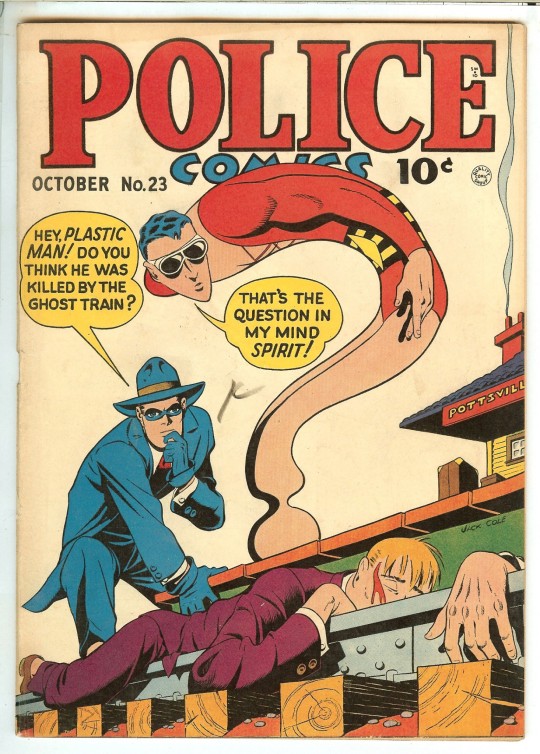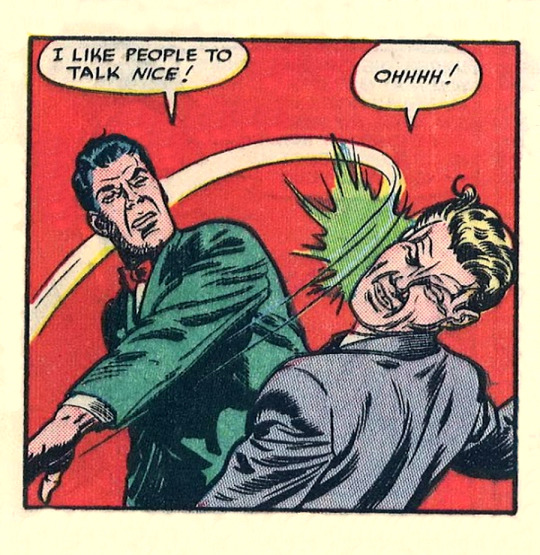#police comics
Explore tagged Tumblr posts
Text
woozy gave plastic man his nickname!

so everyone come and look at this, this is from police comics issue seventeen. once "plas" met woozy, that is also when he acquired that iconic nickname. before that he was usually called his full name or "plastic"
#plastic man#woozy winks#superhero comics#dc comics#superheroes#golden age comics#quality comics#police comics
46 notes
·
View notes
Text

Vintage Comic - Police Comics #023
Pencils: Jack Cole
Inks: Jack Cole
Quality (Oct1943)
#Comics#Quality Comics#Police Comics#Jack Cole#Plastic Man#Spirit#The Spirit#Vintage#Art#Quality#1943#1940s#40s
260 notes
·
View notes
Text

170 notes
·
View notes
Text

The year was 1942 and this is how Jack Cole was paneling his comic book stories, it's so dynamic and interesting to look at, highlighting different aspects of the scenes using different angles and paneling designs. Plastic Man as a character is pretty strong as well, playing with the moral ambiguity of being both a criminal and a cop, using both sides to accomplish what he believes is right, turning his criminal expertise in investigative abilities. It's no wonder from issue #9 onward his stories went from the middle of the book to the opening pages, also gaining a 3 extra pages upgrade to develop more complex narratives, and consistently featuring on the cover.


American war propaganda was starting to seep into the comic book medium, so the stories were getting progressively more anti-fascist and more racist against Asian people, especially the Japanese. It can be uncomfortable to read (probably not as uncomfortable as more nationalist superheroes and books from the time), but it's a glimpse into the way of thinking of the status quo in that moment and an interesting perspective into our shared history.
Either way, Plastic Man stories were getting better and better structurally as Jack Cole seems to find his own pace and style.
From Police Comics #9 (1942) by jack Cole
#going through a plastic man phase#plastic man#eel o'brian#jack cole#golden age#quality comics#police comics#world war ii#dc comics#dc#comics#comic book history#reading log#text#comic panels
20 notes
·
View notes
Text

Police Comics #40 March 1945
25 notes
·
View notes
Text

117 notes
·
View notes
Text

Plastic Man
Police Comics #40: Who Put the Overalls in Mrs. Murphy's Chowder?
by Jack Cole
40 notes
·
View notes
Photo

(1943)
#Police Comics#1943#Plastic Man#comic book#Jack Cole#cover#vintage#The Spirit#Will Eisner#Quality Comic Books#1940s#golden age#The Bookstore Mystery
90 notes
·
View notes
Text

Will Eisner “The Spirit” Original Art splash page for The Haunted House, Police Comics #19 (May 1943) Source
With colors by Joe Kubert (per GCD)

15 notes
·
View notes
Text
Plastic Man Issue #1- 1941
Unlike modern comics, the first issue of Plastic is one story among four. The other stories featured in this sixty-two page comic are The Human Bomb, The Phantom Lady and The Mouthpiece.
Plas's first adventure is of course his origin story. Left for dead after a robbery gone wrong Eel O'Brien flees into...the mountains? The City Eel lives is not given a name, at least not in the first several stories, but it's coastal and near a mountain range. This would lead one to think it is somewhere on the West Coast, but that can't be true for reasons I will explain much (much) later.
Anyway. Eel, shot and exposed to mystery acid, faints on the trail. He is then discovered by a monk. You know how every major city has its local mountain monastery. This unnamed monk takes him in and nurses him back to health, and Eel is so moved by his kindness that he renounces all crime and swears to use his new powers to stop evil.
This issue really makes you think..."Hey, has Eel killed people?" It's just a thought. Because, when he wakes up he thinks he's in Heaven, and is adamant that there is no way he could ever be in Heaven. So, again, has this guy murdered people? It's something to think about, we can also think about his costume. It's almost the same as usually depicted, but the left sleeve is black, and he had little black booties.
I hate the booties. I think Jack Cole was correct in saying "Fuck it, flipper feet" Another fun thing to note. This early version of Plas cannot morph clothes on his body. He has to change his clothes to fully become Plastic Man, or to do any disguises.
Eel using his new dual identities captures his old gang and turns them in. The Police inadvertently dub him The Plastic Man, and almost a hundred years later a random lady on the internet would post about it for the other weirdos to read about.
If you want to read the original 40's run you can. The Digital Comics Muesuem is free to use. They're dedicated to preserving comic book history, please visit, and consider donating.
#vintage comics#the digital comics museum#1940s comics#police comics#plastic man#patrick eel o'brian#dc comics#woozy winks
5 notes
·
View notes
Text

Phantom Lady is featured here in her Police Comics incarnation. I have covered Sandra Knight’s origins and back story in an earlier blog, but her original appearances are distinctive for her, less face it, extremely skimpy yellow attire. When Sandra transitioned to her own title, she took on the look of a 1940s Hollywood starlet but her costume, while hardly modest, wasn’t quite as sexualised as in her earlier appearances. This early overtly voluptuous look of Phantom Lady was not simply a product of mid twentieth century sexism, although that certainly played a part, it was also a genuine attempt to attract the interest of male readers, who it was hoped would be interested in the heroine’s curves, while also retaining the original target fandom of teenage girls and young women, genuinely inspired by this intelligent and fearsome super heroine who always seemed to be one step ahead of the (male) cops, typified by the page featured here (interestingly inspired by Edgar Allen Poe’s gothic novella, The Black Cat).
What I also like about the Police Comics version of the character is her look - Sandra appears older and more mature in her Police Comics adventures, making her exploits seem rather more convincing than in her later incarnation where the bored-little-rich-girl aspect of her character predominated.
The page featured above is from the Phantom Lady adventure Mystery of the Black Cat! published in Police Comics #17 (March 1943).
Source: comicbookplus
4 notes
·
View notes
Text

35 notes
·
View notes
Text





5 Random Comics
#Comics#5 Random#5 Random Comics#Police Comics#Unexpected#Secret Hearts#Toyland Comics#Li'l Pals#Vintage#Art#Marvel Comics#Quality Comics#DC Comics#Fiction House#Plastic Man#Spirit#The Spirit
20 notes
·
View notes
Text

Too much perfume in Police Comics #66
40 notes
·
View notes
Text
I read way more DC comics than Marvel usually, I like reading both, but boy how I envy Marvel's sweet sweet Epic Collection books, there are modern stories, silver and golden age stories (their Human Torch, Namor and War comics from old times), even less popular titles and runs like bronze age She-Hulk and Spider-Woman (I like them both ok?) are all collected and published... Why would DC not go the same route and publish their silver age Legion of Super-Heroes, Superman, Lois Lane and Jimmy Olsen comics (that were hugely popular back then), the golden age Police Comics (with all the classic Plastic Man material), Alan Scott's Green Lantern, Jay Garrick's Flash, Captain Marvel comics, some of these are so good, but I have to read them in potato quality in shady websites, at least make digital files of these runs, you don't need to publish them all, but make them accessible, this is your last warning DC, I'm keeping the Bat-family hostage and I'm not afraid to hurt them, make your old stuff accessible!
#dc comics#marvel#comics#golden age#silver age#silver age superman is pure joy#marvel's epic collections are so good#fan rage#threats#🔪#police comics#plastic man#green lantern#alan scott#jay garrick#lois lane#jimmy olsen#namor#human torch#she-hulk#etc#text#thoughts
10 notes
·
View notes
Text

Police Comics #98 February 1950
12 notes
·
View notes